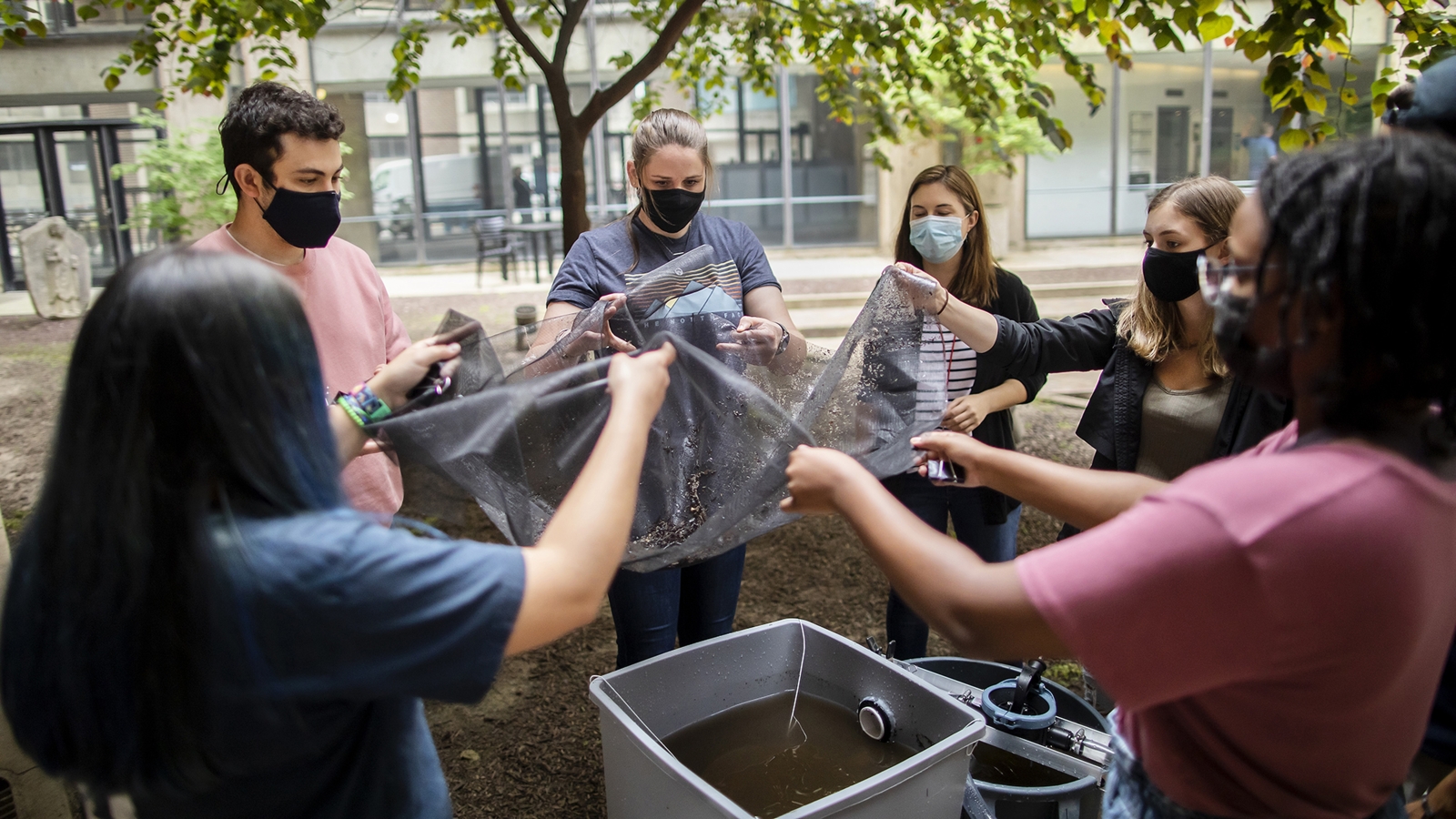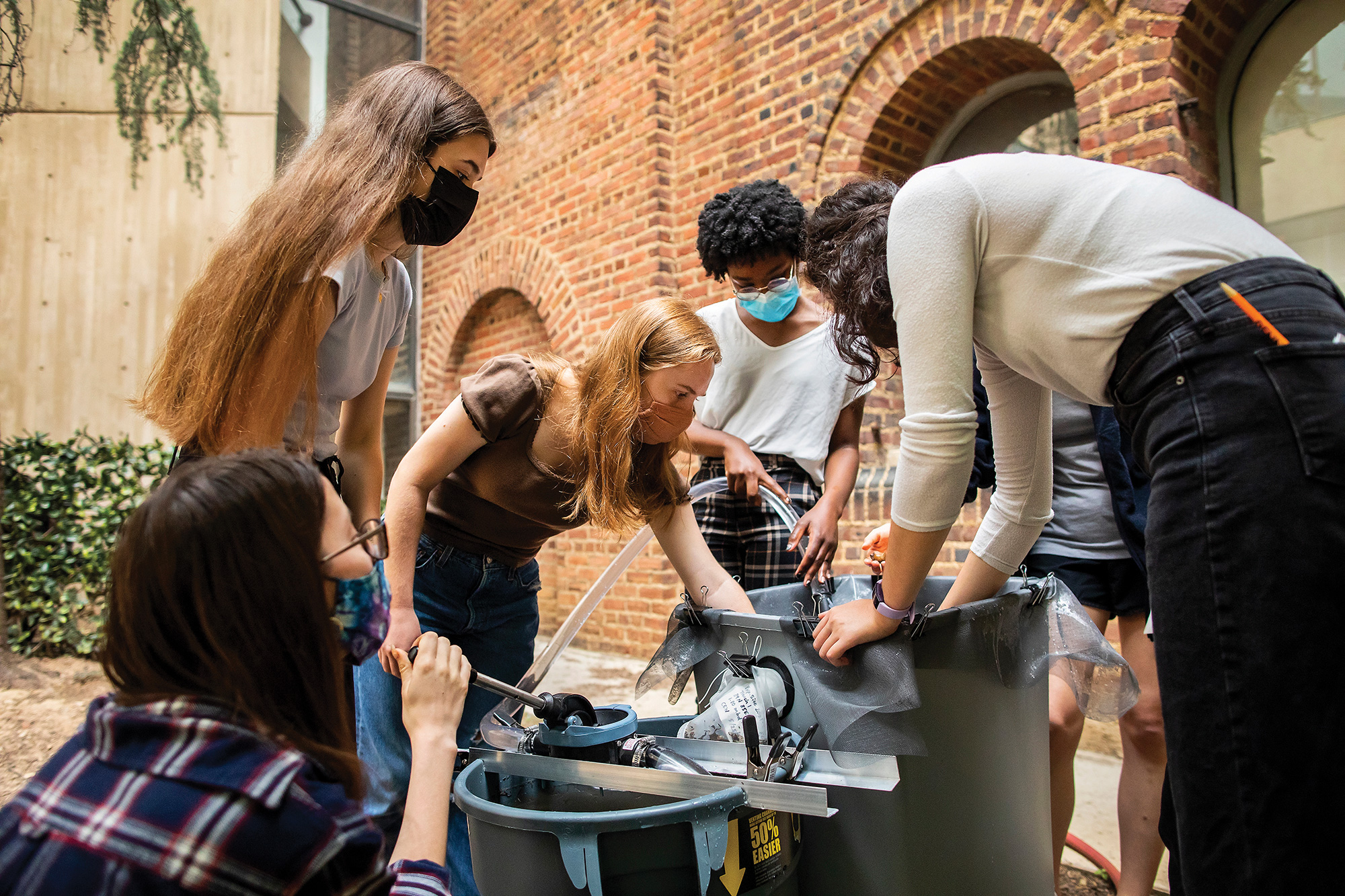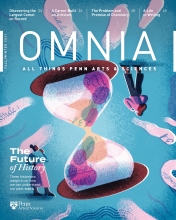Fieldwork Experience, No Travel Required
During a two-week, in-person bootcamp at the Penn Museum, 11 undergrads learned basic archaeological skills in subjects from ceramics and sample-taking to archaeobotany.

On a muggy summer morning in the Stoner Courtyard at the University of Pennsylvania Museum of Archaeology and Anthropology, five undergraduates surrounded a square patch of ground, 1 meter by 1 meter, cordoned off by neon pink rope.
Using trowels, they dug up the topsoil, which they dumped into a nearby five-gallon blue bucket. With enough surface dirt removed, they turned to a handheld brush and dustpan. “You might have thought before this that you couldn’t clean dirt,” says Mark Van Horn, a graduate student in Art and Archaeology of the Mediterranean World. “But you can actually get dirt very clean.”
From there, they systematically moved through the tidied site, inspecting anything that stood out. By day’s end, they’d found a broken plastic sprinkler nozzle and a heavy glass fragment. Ten feet away, at another site abutting a Museum building, a second student group discovered a rusty nail, more glass, some pottery, and farther down, bricks coated with tar, consistent with historical construction practices aimed at keeping water out of the foundations.
The day-long excavations marked the halfway point of a two-week archaeology bootcamp facilitated by the Penn Museum and spearheaded by Anne Tiballi, the Museum’s director of academic engagement. Eighteen instructors, including faculty from the Departments of Anthropology and Classical Studies, the Museum’s Center for the Analysis of Archaeological Materials, and Penn Libraries, among others, offered 11 undergraduates basic archaeology skills in subjects ranging from ceramics and sample-taking to fieldwork design and archaeobotany.
The pandemic had halted much fieldwork, an important and often transformative learning experience for students considering a career in archaeology.
“We were all feeling really bad for our students that they basically missed two summers of being able to learn how to do this and to see how the whole thing works,” says Lauren Ristvet, Associate Professor of Anthropology, Chair of the Art and Archaeology of the Mediterranean World graduate group, and an associate Museum curator. “You can’t have a Zoom excavation. Learning how to excavate isn’t just reading a book or talking about it. There’s a crucial step of learning the physical skills involved.”
On-campus fieldwork emerged as a viable solution. Most of Penn’s active archaeologists joined the effort, creating a syllabus that covered as many subjects as could fit into two weeks.
Ashley Fuchs, C’22, a political science major, learned about the opportunity through an email from the Department of Classical Studies. “It became the perfect opportunity to dive deeper into archaeology and gain a broader understanding of the subject without having to travel outside of Philadelphia,” she says.
Sometimes gaining that wider understanding means breaking down a subject into its tiniest parts, like the preserved plant material—seeds and fruits from prehistoric meals, for example—that Chantel White, an archaeobotanical teaching specialist, studies.
“Many people think that fragile organic material such as plant remnants can’t possibly survive for thousands of years,” says White. But “there is more to archaeological excavation than meets the eye. We must also carefully consider evidence for past human activities at the microscopic level.”

Students in the bootcamp learn basic archaeological skills.
During White’s half-day session, which began with a broad conversation about archaeobotany, she taught the students about flotation and dry sieving, two techniques used to separate out organic materials like carbonized seeds, wood, and nutshells.
“It’s one thing to read about flotation in a textbook and a completely different thing to learn how to operate a flotation system yourself and to see how collecting tiny fragile seeds actually takes place,” she says. “That kind of experience is valuable to becoming a better archaeologist and also to understanding how all the pieces of the archaeological puzzle fit together.”
For Van Horn, one such component is the solidarity that builds after spending weeks of fieldwork in close quarters, eating and sleeping and working with the same people, often from a variety of institutions and places. It’s something he felt during his own experiences in Europe and Israel.
“You get this mixing pot of people, who you get to know very well. You get incredibly comfortable,” he says. “That’s something we couldn’t really mimic to a large degree. But even with just two weeks and without a shared living situation, a lot of the joking and camaraderie started to emerge by the end.”
The bootcamp threw students headfirst into archaeological practice, which can be demanding mentally and physically—like an early experience in Penn Park led by Thomas Tartaron, Associate Professor in Classical Studies, and Jason Herrmann, Kowalski Family Teaching Specialist for Digital Archaeology.
The plan was to conduct a field survey, a process that requires a good deal of equipment. The students carried everything themselves—a pop-up tent, a wagon of pottery sherds, clipboards, surveying equipment, and poles—just as they would have done at a real site.
That day turned out to be Fuchs’s favorite. “It’s nothing I could have ever fathomed,” she says. “I loved being outside with a group of people, having Professor Tartaron talk about excavations and field survey in Greece, and feeling the physicality of archaeology—walking, picking up pottery, and going through the extensive data collection process.”
Archaeology isn’t an easy field. It’s messy, with literal digging in the dirt required. But at the end of the day, it’s about people, those whose history is waiting to be discovered, and those who endeavor in the process of that discovery. For two weeks this summer, 11 undergrads got down in the dirt and came away with a newfound appreciation for history and each other.



